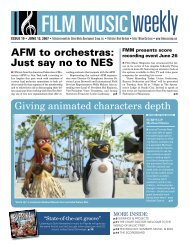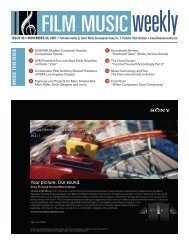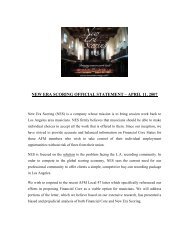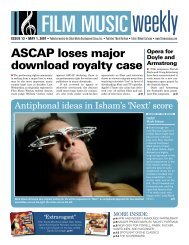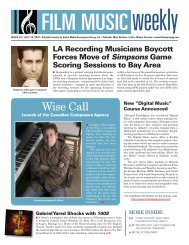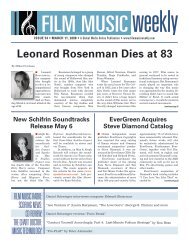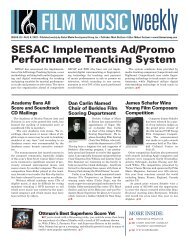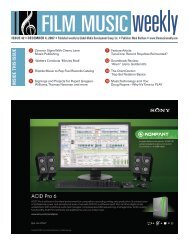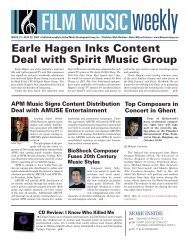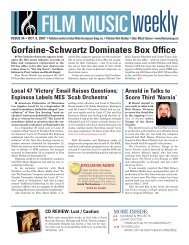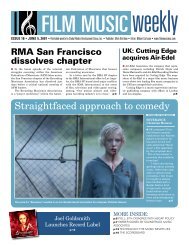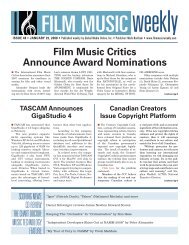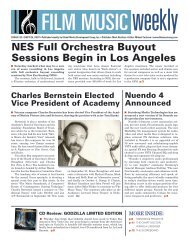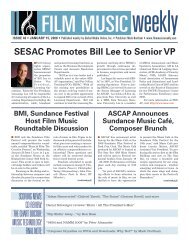February 12, 2007 - Film Music Magazine
February 12, 2007 - Film Music Magazine
February 12, 2007 - Film Music Magazine
Create successful ePaper yourself
Turn your PDF publications into a flip-book with our unique Google optimized e-Paper software.
COURTESY OF JOHN SAULT<br />
Producer Steve McLaughlin and Ilan Eshkeri in the booth. Steve McLaughlin at work.<br />
Did you use any special techniques to portray<br />
Hannibal Lecter in your score?<br />
Some of the sounds I used that spring to mind are<br />
string harmonics with bowed vibes, quarter tone bends in<br />
french horns, fast string passages marked with x instead<br />
of notes, sul ponticello in the strings and bowed dulcimer.<br />
I was also lucky enough that Claire Booth, a rising<br />
star in the opera world, was able to squeeze me into her<br />
schedule to sing the soprano solos in the “Requiem” and<br />
the “Agnus Dei”, as well as being the voice of Hannibal’s<br />
sister.<br />
There is also some music composed by Shigeru<br />
Umebayashi in the film. Did you work together<br />
on the music, or was this one of those situations<br />
where two composers worked separately on the<br />
score?<br />
We worked together quite a lot, exchanging ideas and<br />
we recorded together at Abbey Road. Ume mostly did the<br />
scenes that involved Hannibal’s aunt. He’s a great composer,<br />
and I really enjoyed working and becoming friends<br />
with him.<br />
The director, Peter Webber, previously made a<br />
very “European” style film, Girl With a Pearl<br />
Earring, which had a great romantic score by<br />
Alexandre Desplat. What specific demands did he<br />
have on the score for Hannibal Rising?<br />
Peter wanted to always play what was in Hannibal’s<br />
head. Even in scenes where Hannibal wasn’t on-screen,<br />
it was always about how he effected the other characters.<br />
Also, the more we held back on emotion the better<br />
it played Hannibal. In practice this meant no vibrato!<br />
In fact the short answer to your question is that Peter’s<br />
most frequent demand on the score was “no vibrato”!<br />
Dino De Laurentiis is such a legendary producer<br />
in Hollywood. How did he deal with the music in<br />
Hannibal Rising? Does he have a lot of input in<br />
the process?<br />
Dino came to virtually all the sessions. He was very<br />
involved in a lot of the creative aspects of the film. I found<br />
his input to be very broad and never caught up in detail.<br />
COURTESY OF DNA MUSIC LTD<br />
It either worked or it didn’t. It was either emotional or<br />
not, scary or not. That kind of overview is very helpful<br />
and stops you from over analysing and trying to re-work<br />
something that is fundamentally flawed.<br />
What parts of the film were the most difficult to<br />
get right musically?<br />
Getting Hannibal’s theme was really really hard. I<br />
wrote five and even recorded three different themes for<br />
Hannibal before I finally wrote something that everyone<br />
agreed was the one. Once that was done the rest of the<br />
film wrote itself. The scenes where I composed the theme<br />
were the escape to France from the orphanage and the<br />
deposition where Hannibal tells his story to the inspector.<br />
How did you find the keys to those sequences?<br />
By trying over and over and over again. Sometimes<br />
you can have a concept for a character or scene and that<br />
helps you find the right vibe, but sometimes you just have<br />
to dig deep and find that melody and that takes a lot of<br />
time and effort. There were times on Hannibal Rising,<br />
as there have been on all of my projects for that matter,<br />
where I honestly thought that I’d just been lucky up until<br />
now and that I would never write a decent tune again.<br />
How important is melody to you as a composer?<br />
What was the main focus in Hannibal Rising<br />
– melody, orchestration, mood, effects?<br />
I think all those things are important. There is a<br />
main theme for Hannibal in the film. Other characters<br />
or ideas in the film were played by motifs and textures. I<br />
would hope that all these pieces of music are distinctive<br />
and help guide the audience through the film’s emotional<br />
journey.<br />
I know that you are right now scoring a film<br />
called Stardust. Can you tell me a little about this<br />
project?<br />
It’s a Matthew Vaughn picture. I’m literally just<br />
starting so all I can say is i’m really excited to be a part<br />
of the team, I saw a screening the other day and i think<br />
the film is brilliant! n<br />
THE FILM:<br />
HANNIBAL RISING<br />
Plot outline: The story of<br />
Hannibal Lecter’s formative<br />
years and how he became a<br />
cannibalistic monster.<br />
Director: Peter Webber.<br />
Producers: Dino De Laurentiis,<br />
Martha De Laurentiis,<br />
Tarak Ben Ammar.<br />
Stars: Gaspard Ulliel, Dominic<br />
West, Gong Li, Kevin<br />
McKidd, Rhys Ifans.<br />
THE SCORE:<br />
HANNIBAL RISING<br />
Composers: Ilan Eshkeri<br />
and Shigeru Umebayashi<br />
Conductor: Andy Brown.<br />
Orchestrators: Julian<br />
Kershaw, Nick Ingman.<br />
Orchestra: The London<br />
Metropolitan Orchestra (60-<br />
75 pieces)<br />
Studio: Abbey Road.<br />
Scoring mixer: Steve<br />
McLaughlin.<br />
FILM MUSIC weekly ISSUE 2 • FEBRUARY <strong>12</strong>, <strong>2007</strong> 7



